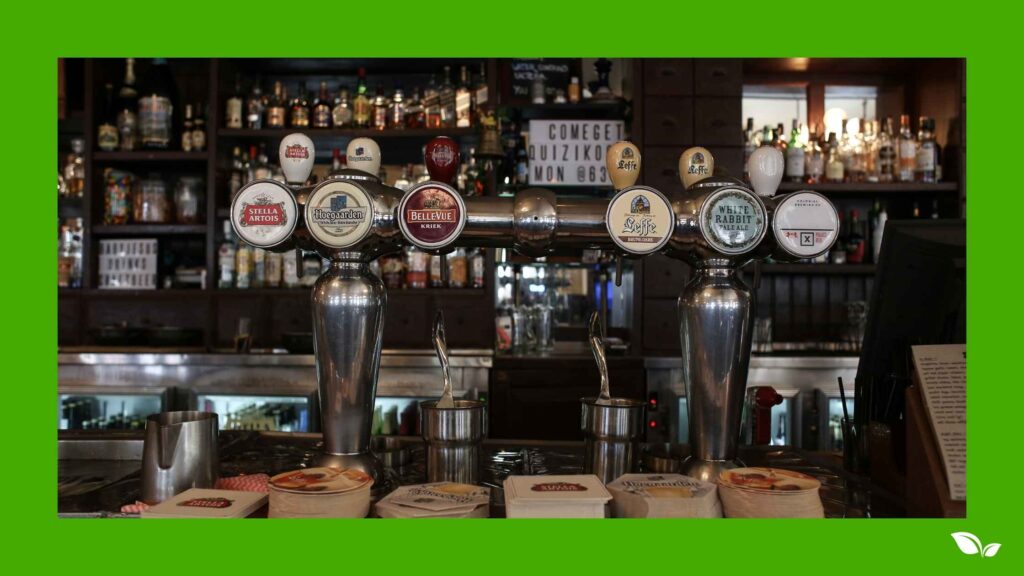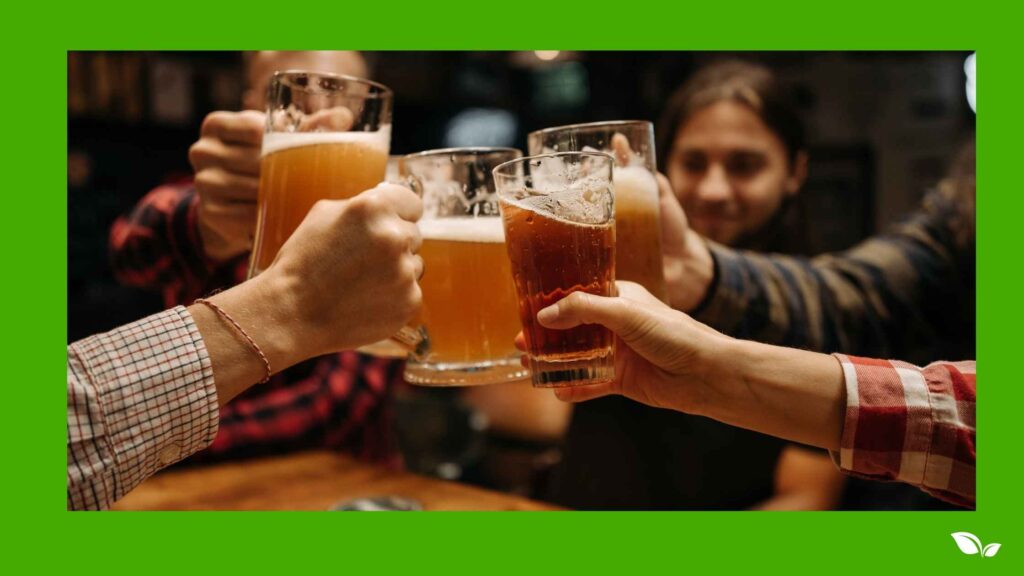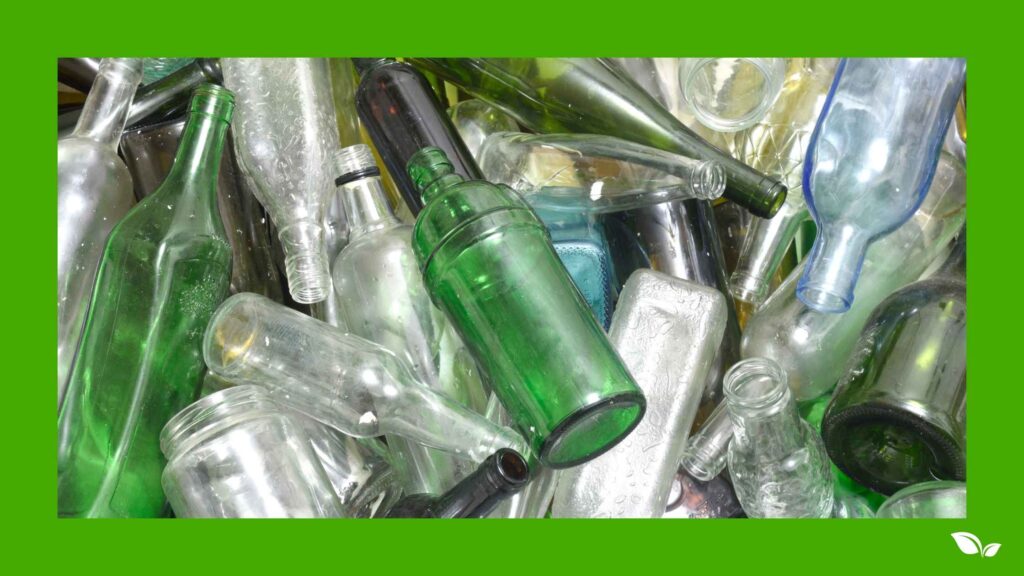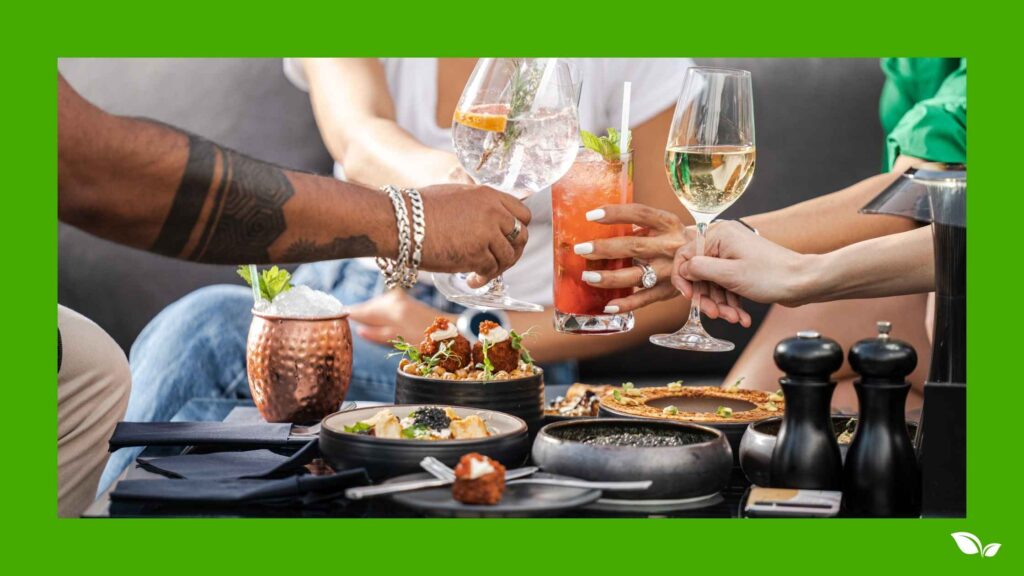Pubs, clubs, and bars generate a diverse range of waste materials, including general waste (such as packaging and non-recyclables), recyclables (like paper, plastics, and metals), food waste, and a large amount of glass waste, primarily from beverage containers like lager, wine and spirit bottles.
Efficiently handling waste in your pub, club, or bar is not only essential for environmental sustainability but also for keeping costs as low as possible.
Implementing effective waste separation and recycling practices not only minimises your business’ ecological footprint but also ensures a clean and inviting environment for your customers and your staff.


1. What Waste Do Pubs, Clubs and Bars Typically Produce?
Pubs, clubs, and bars, typically produce a large amount of the four main waste streams: general waste, dry mixed recycling, food waste and glass waste.
Here’s some examples of the types of waste pubs, clubs and bars typically produce:
General Waste:
- Single-Use Items: Disposable items such as paper napkins, disposable cutlery, and packaging materials.
- Non-Recyclable Packaging: Materials like plastic wrap, Styrofoam, and foil.
- Discarded Decor: Decorative items, signage, or promotional materials that are no longer needed or damaged, such as banners, posters, and seasonal decorations, confetti etc.
- Cleaning Supplies: Empty containers of cleaning chemicals, used cleaning materials like mop heads, and disposable cleaning wipes.
- Non-Recyclable Barware: Items such as stirrers and disposable cocktail napkins that cannot be recycled.
Recyclable Waste (Dry Mixed Recycling):
- Plastic Bottles and Containers: Empty plastic bottles, especially from beverages and kitchen supplies.
- Cardboard Boxes: Packaging materials and boxes from deliveries.
- Paper Products: Used paper products, including menus, promotional materials, tickets and wristbands etc.
Food Waste:
- Expired or Spoiled Food: Perishable items past their expiration date or spoiled.
- Leftovers: Uneaten food from customers or excess food from food preparation.
- Overproduction/Uneaten Inventory: Unserved or untouched food from the kitchen or bar.
- Spilled/Ruined Food: Food that’s accidentally spilled, overcooked, or otherwise unsuitable for serving.
Glass Waste:
- Wine, Prosecco and Champagne Bottles: Empty, clean wine bottles, which may be of various shapes, sizes and colour.
- Spirit Bottles: Empty, clean bottles which were used for spirits like vodka, whiskey, rum, gin, tequila etc.
- Shot Glasses: Broken or chipped shot glasses that are no longer suitable for use.
- Beer Glasses: Damaged or cracked beer glasses and steins that cannot be repaired and are considered waste.
- Cocktail Glasses: Broken or chipped cocktail glasses and martini glasses that need to be discarded.
Cardboard and Paper Waste:
Pubs, clubs, and bars often deal with a lot of cardboard. Having a separate bin for cardboard can be more cost-effective than filling up your dry mixed recycling bin with it.
Cardboard waste in hospitality typically comes from:
- Packaging and delivery boxes for drinks and food supplies.
- Outdated or unused promotional materials like posters or table talkers.
- Flattened boxes from stock replenishment.
Cardboard is highly recyclable, but it’s important to keep it dry, clean, and separate from general waste to avoid contamination and maximise its recycling value.
Sanitary Waste:
While it’s not the most glamorous side of running a venue, sanitary waste management is essential for hygiene, comfort, and legal compliance.
Sanitary waste in pubs, clubs, and bars often includes:
- Feminine hygiene products (tampons, pads).
- Nappies and incontinence items.
- Tissues, wipes, and other personal hygiene disposables.
You’ll typically find this type of waste in customer toilets and staff facilities.
Why it matters:
- It’s not classed as hazardous, but it can carry bacteria and create hygiene risks if not handled properly.
- Workplace health and safety regulations require businesses to provide discreet, regularly emptied sanitary bins in restrooms.
- Dedicated sanitary bins, regular collections, and proper handling prevent unpleasant smells, maintain dignity, and ensure compliance.
Confidential Waste:
Even in hospitality, sensitive paperwork must be disposed of securely to protect privacy and comply with GDPR.
Examples include:
- Staff records and HR files.
- Reservation or booking forms with customer details.
- Financial records, receipts, and invoices.
Many pubs, clubs, and bars work with secure shredding or confidential waste services to ensure documents are destroyed, avoiding data breaches.
Pest Control:
In a busy hospitality environment, waste management is also about preventing pests that can threaten hygiene and reputation.
Pest issues often stem from:
- Food scraps or spills left in open bins.
- Poorly sealed or overflowing waste containers.
- Infrequent bin cleaning or waste area maintenance.
You might see:
- Food waste discarded in open kitchen bins.
- Spilled waste around glass or bottle bins.
- Dirty bins attracting flies or rodents.
To stay pest-free, keep all bins closed, clean waste storage areas regularly, and work with a pest control partner who can offer ongoing prevention rather than just reacting when a problem occurs.
To find out more about exactly what your waste management will cost your business, you can get a free quote now.
In addition, your hospitality business may require Sharps bins in bathrooms and for cleaning staff to properly dispose of anything left over after the venue has closed.

2. Why Is Proper Hospitality Waste Disposal Important for My Pub, Club or Bar?
Proper waste disposal in bars, pubs, and clubs is essential to save costs, promote sustainability, and adhere to legal regulations for your hospitality business.
Inefficient waste management not only burdens your pub, club or bar with unnecessary expenses but also impacts the environment, which is particularly important for businesses in the hospitality sector that tend to generate huge amounts of waste.
Proper waste management practices are crucial for bars, pubs, and clubs to operate sustainably and minimise their ecological footprint.
A more sustainable business normally has a positive effect on your bottom line.
So, why is waste disposal important?
1. Cost Savings
Efficient waste disposal in bars, pubs, and clubs, with the use of separate bins, can lead to significant cost savings for your business.
The expenses associated with waste collection can vary based on several factors, including the type of waste, the frequency of pickups, the size of bins, and mandatory government-imposed fees for excess weight.
By segregating waste into different categories, such as food waste, glass waste or recyclables rather than just general waste, the overall weight in general waste bins or mixed recycling bins can be reduced. It is also now a legal requirement to separate waste streams based on the Separation of Waste regulations that are in place in England, Scotland, Northern Ireland and Wales. You can read more about waste laws that exist here, or feel free to call our team who can explain how these laws affect your business.
Understanding the legislation helps bars, pubs, and clubs avoid additional charges due to excess weight, financial penalties or service disruptions.
While the initial investment in additional waste bins may seem like an added cost, it has been proven to be a cost-effective long-term strategy for other hospitality businesses just like yours.
2. Environmental Responsibility
Pubs, clubs, and bars can generate substantial amounts of waste due to the large volume of customers that enter the venues, and the behaviour of generating and disposing of waste in these types of hospitality establishments.
It’s vital for them to take responsibility for their environmental impact by implementing effective waste management practices.
Using separate waste bins for distinct waste streams, is a smart strategy for these hospitality businesses.
This not only reduces their environmental footprint but can also result in huge cost savings.
3. Maintaining a safe and hygienic environment for employees and customers
In the hospitality industry, maintaining a safe, hygienic environment for both staff and customers is vital.
Health and wellbeing come first, and meeting legal requirements, such as providing adequate sanitary waste disposal is a fundamental responsibility.
Preventing pests like rats, ants, maggots, and other infestations is crucial to avoid damaging both safety standards and your venue’s reputation. Partnering with a waste management provider that includes pest control helps tackle potential problems at the source, focusing on prevention rather than reacting after an outbreak. This proactive approach protects your premises, your customers, and your brand.
Here’s why responsible waste management matters in pubs, clubs, and bars:
4. Diverting Waste from Landfills:
Segregating waste into different categories helps reduce the amount of waste sent to landfills.
Landfills hugely contribute to ongoing environmental issues, particularly the release of harmful methane gas.
A significant portion of the food waste put in general waste bins ends up in landfills, exacerbating the global climate change crisis – hence why new regulations have come into effect to mandate the separation of food waste and other waste streams.
5. Reducing Methane Emissions
Venues just like yours will often serve food and snacks, and customers enjoy drinks and entertainment, which can result in considerable waste generation.
When food waste from these establishments ends up in the general waste bins, it may ultimately be disposed of in landfills.
In landfills, without access to oxygen, the food waste decomposes and releases methane, a harmful greenhouse gas.
6. Promoting Recycling
In the dynamic atmosphere of pubs, clubs, and bars, where a wide variety of products are sold and consumed, having an efficient and well-structured recycling plan is crucial.
Food waste, glass bottles, paper, cardboard, confidential waste - the amount of waste that hospitality venues produce is almost endless.
If your business has a successful recycling programme, it can hugely cut costs for you as well as contribute to a greener society.
Having clearly labelled and easily accessible recycling bins can encourage both staff and customers to participate in recycling efforts.
7. Legal Compliance
In the hospitality sector, pubs, clubs, and bars must stay up to date with waste collection legislation to ensure compliance and maintain responsible waste management practices.
Existing UK legislation requires hospitality businesses to minimise waste by preventing, reusing, recycling, or recovering it. This applies to all waste streams, including food waste, glass waste, dry mixed recycling, and general waste.
The Separation of Waste (England) Regulations 2025, also known as Simpler Recycling, recently introduced further changes. Currently all businesses with more than 10 employees must separate their waste. By 2027, even micro-businesses with fewer than 10 employees will be required to separate their waste streams. Similar laws apply to businesses in Scotland, Wales and Northern Ireland – learn more here.
Using clearly labelled, dedicated bins for each waste type not only ensures your venue meets legal obligations but also helps reduce landfill waste, improve recycling rates, and cuts overall disposal costs.

3. What Are Some UK Pub, Club and Bar Waste Statistics?
Did you know that Britain’s pubs throw away over 860 million pints of beer every single year?
Hospitality venues like bars, nightclubs and pubs produce over 1.1 million tonnes of food waste each year, accounting for about 10% of the overall food waste in the country.
In a cost-of-living crisis, it’s easy to see why it’s so important to have an efficient waste management portfolio and ensure the most environmentally friendly and ethical waste management.
Food waste generated by pubs in the UK emits the same quantity of carbon dioxide (CO2) as more than 600,000 cars!
This food waste can come from leftovers and plate waste, over-ordering ingredients, and ruining food by burning it or spilling it.
This quantity of carbon dioxide contributes to climate change, causing extreme weather events and rising temperatures.
Rising temperatures can destroy entire ecosystems, and causes sea levels to rise, destroying land for both humans and animals.
The poor air quality has been scientifically proven to negatively affect human health and has negative consequences on food security and the economy.
Did you know that food waste costs Britain’s pub operators more than £350 million every single year?
The global food crisis is not just limited to the UK.
Food waste contributes to extreme environmental degradation and food scarcity.
Addressing food waste is essential for sustainability and reducing its economic and environmental impacts worldwide.
If you’re passionate about minimising your business waste for your pub, club, or bar and improving your impact on the environment, then know we’re here to support your journey.

4. What Size Bins are Best for My Hospitality Waste?
Choosing the right size bins for your bar, pub or club is an important decision, which will be based on factors like your venue’s waste storage capacity, the types of waste you generate, and how much waste your business produces.
In nightlife venues, various types of waste, including general waste, glass, plastic, paper, and food waste, are commonly produced.
Waste Basics offers a range of bin sizes tailored to accommodate the specific waste output of bars, pubs, and clubs, ensuring an ideal fit for your specific waste management requirements.
Some venues choose to order a few different bin sizes to effectively meet their waste needs and available storage space.
Our approach is flexible to ensure the most efficient waste management for all of our clients.
If you’re unsure about which bin sizes suit your bar, pub, or club’s waste production, feel free to reach out to our friendly and knowledgeable team!
We’re here to offer completely complimentary guidance and assist you in making the best choice for your waste requirements.
General Waste
Every nightlife venue is unique, and the volume of general waste produced, along with available bin space, can vary significantly.
At Waste Basics, we offer four distinct options to meet your bar, pub, or club’s general waste needs.
Unlike some waste collectors that might complicate things to maximise their profits, we’re committed to providing clear and transparent pricing, every single time.
We’re here to assist you with your general waste management requirements in your nightlife establishment.
1100L General Waste Bin
Our 1100L general waste bin is the top pick for our clients operating pubs, clubs, and bars.
With a generous pre-collection capacity of up to 70kg, it can handle around 18 bin bags.
This bin stands at 1.40 meters in height and 1.26 meters in width.
660L General Waste Bin
The 660L general waste bin is also a popular choice for many pubs, clubs, and bars in the UK.
It offers a pre-collection capacity of up to 40kg, providing enough room for about 12 bin bags.
This bin stands at 1.3 meters in height and 1.26 meters in width.
360L General Waste Bin
Another option is the 360L bin which is often selected for smaller hospitality businesses where space is limited. It holds around 5-6 bin bags and a maximum weight capacity of 25kg.
This bin is 1.1 metres in height and 0.61 in width.
240L General Waste Bin
For more streamlined waste management in your venue, the 240L bin is a really practical choice.
It can store up to 15kg of waste before collection, equivalent to about 4 bin bags.
This bin is similar in size to a standard household wheelie bin, standing at just 1.08 meters in height and 0.58 meters in width.
Some nightlife venues opt for this bin in addition to larger sizes, serving as a handy top-up solution when you need a bit more space for your general waste.
Dry Mixed Recycling for Pubs, Clubs & Bars
The amount of dry mixed recycling produced and the available space for bins can vary among different nightlife venues.
At Waste Basics, we present four clear options to meet your pub, club, or bar’s dry mixed recycling needs.
Unlike some waste collectors that may make things complex to get the most profit out of your business, here at Waste Basics, we are dedicated to offering straightforward processes and completely transparent pricing.
1100L Dry Mixed Recycling Bin for Pubs, Clubs & Bars
The 1100L Dry Mixed Recycling bin is a favoured choice among our pub, club, and bar customers throughout the UK.
This is mostly due to the fact it’s our biggest size available, with a maximum capacity of 40kg of dry mixed recycling waste.
To give you an idea, that’s roughly equivalent to 115 medium-sized cardboard boxes or about 3,300 plastic bottles!
If you’re unsure about which bin size is right for your pub, club, or bar’s waste, don’t hesitate to contact our friendly team!
They’re here to offer assistance without any obligations and help you make the perfect choice.
660L Dry Mixed Recycling Bin for Pubs, Clubs & Bars
The 660L dry mixed recycling bin is another excellent option for nightlife venues generating a moderate amount of recyclable waste.
With a capacity of up to 25kg, it can handle about 59 flattened cardboard boxes or approximately 2,500 plastic bottles in total.
360L Dry Mixed Recycling Bin
The 360L dry mixed recycling bin is another choice for hospitality venues that have a smaller amount of recyclable waste.
It has a capacity of 15kg which equates to approximately 32 flattened cardboard boxes or about 1,300 plastic bottles.
240L Dry Mixed Recycling Bin for Pubs, Clubs & Bars
For bars, pubs or clubs with limited space or smaller waste storage areas, our 240L dry mixed recycling bin is a great choice.
It can accommodate up to 10kg of recyclable materials, roughly equivalent to 24 empty cardboard boxes or around 700 plastic bottles.
This bin size is similar to a typical household wheelie bin.
Food Waste for Pubs, Clubs & Bars
Our food waste bins have become a highly appreciated choice among our customers, especially in venues where food waste management can pose a significant challenge.
These bins have consistently proven to be a substantial cost-saving solution for our clients over the long term, mainly because food waste is typically much heavier than general waste.
240L Food Waste Bin for Pubs, Clubs & Bars
Our 240L food waste bin may be compact, but it’s incredibly efficient for food waste storage in pubs, clubs, and bars.
This bin can easily accommodate up to 4 full bags of food waste or a weight equivalent to 100kg, roughly the weight of a standard refrigerator or a small piano!
With dimensions similar to a household wheelie bin (1.08m in height and 0.58m in width), it’s a practical choice perfectly suited for your venue. If you’re unsure whether it can meet your establishment’s food waste needs, many of our hospitality clients have opted for multiple food waste bins to ensure they always have enough space for their business’ food waste.
Not sure what you’ll need?
Feel free to call us today some no-obligation, free advice.
Glass Waste for Pubs, Clubs & Bars
Our glass recycling bin has been thoughtfully chosen to meet the glass waste demands of typical pubs, clubs, and bars in the UK.
We recognise that many nightlife venues encounter difficulties in handling their glass recycling, often due to limited on-site storage.
By listening to the feedback from our clients, we’ve provided an effective storage solution customised for small waste storage facilities.
240L Glass Waste Bin for Pubs, Clubs & Bars
While glass recycling might appear to be a short-term expense, our glass recycling bins have consistently proven to be a cost-effective solution for our pub, club, and bar partners in the long run, often saving them lots of investment.
Glass waste bins offer significant benefits, particularly for nightlife venues that generate a substantial volume of glass waste, mainly from beverage bottles and glasses.
Our 240L glass recycling bin is an excellent choice for efficiently managing your pub, club, or bar’s glass recycling waste.
It can store up to 100kg of glass, which is roughly equivalent to the weight of a standard washing machine!
The bin’s dimensions are similar to those of a household wheelie bin, measuring just 1.08m in height and 0.58m in width.
Depending on your pub, club, or bar’s glass waste collection needs, some of our partners opt for multiple bins to handle higher volumes of commercial glass waste, especially in areas like bars or lounges.
Even if your nightlife establishment has limited storage space, our bin dimensions are well-suited for compact and secure waste storage areas.
Unlike other waste collection providers that may have hidden fees or variable costs, we are committed to offering transparent pricing.
Feel free to reach out for a no-obligation, free call to learn more about how we can assist your pub, club, or bar with efficient glass recycling.
5. What is the Pub, Club, or Bar Waste Collection Process?
The waste collection process is a simple 4-stage model.
How does nightlife venue waste collection work, and what are the next steps?
- Choose Your Bins – Select the sizes and types you need.
- Arrange Delivery – Bins delivered without extra rental charges.
- Fill Your Bins – Keep waste separated.
Scheduled Collection – Regular pick-ups based on your venue’s needs.
We will set out a schedule that suits you and your business needs, entirely based on the type and amount of waste you produce.
At Waste Basics, we keep recycling simple, transparent, and affordable. Get your free quote today and see how much you could save.
![bar[1]](https://wastebasics.co.uk/wp-content/uploads/2023/11/bar1-2240x1120.jpg)





